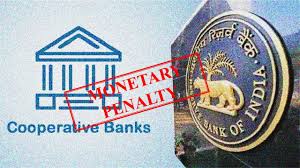RBI Imposes Monetary Penalties on Co-operative Banks
The Reserve Bank of India (RBI) has recently taken a decisive step by imposing monetary penalties on several co-operative banks across the country. This move comes as part of the RBI’s ongoing efforts to enforce regulatory compliance and maintain the stability of the banking sector.
Background of the Issue Co-operative banks play a crucial role in the Indian banking system, particularly in serving the financial needs of rural and semi-urban areas. However, these banks are also subject to regulatory oversight by the RBI to ensure their financial health and protect the interests of depositors.
Penalties Imposed In its latest action, the RBI has levied monetary penalties on several co-operative banks for various violations of regulatory norms. These penalties range from moderate to significant amounts, depending on the severity of the infractions detected by the central bank.
Impact on the Banking Sector The imposition of monetary penalties sends a clear message to co-operative banks regarding the importance of adhering to regulatory guidelines. It underscores the RBI’s commitment to maintaining the integrity and stability of the banking sector, which is essential for sustaining economic growth and fostering public trust in financial institutions.
Way Forward To avoid similar penalties in the future, co-operative banks need to prioritize regulatory compliance and strengthen their internal control mechanisms. By enhancing transparency and accountability, these banks can better fulfill their role in providing accessible and reliable banking services to all sections of society.
Conclusion The RBI’s action to impose monetary penalties on co-operative banks highlights the importance of regulatory compliance in the banking sector. It serves as a reminder for financial institutions to uphold the highest standards of governance and risk management to safeguard the interests of depositors and maintain the overall stability of the financial system.

Why this News is Important:
Significance of RBI’s Action The recent imposition of monetary penalties by the RBI on co-operative banks holds significant importance for various stakeholders within the banking sector.
Ensuring Regulatory Compliance This move underscores the RBI’s commitment to ensuring that co-operative banks adhere to regulatory norms and maintain financial discipline.
Protecting Depositors’ Interests By penalizing banks for regulatory violations, the RBI is taking proactive measures to protect the interests of depositors and maintain the overall stability of the banking sector.
Strengthening Financial System Imposing penalties on errant banks sends a strong message about the importance of transparency, accountability, and good governance in strengthening the financial system.
Promoting Trust and Confidence Such regulatory actions help in promoting trust and confidence among depositors and investors, which are essential for the smooth functioning of the banking system.
Encouraging Compliance Culture The RBI’s action serves as a deterrent for banks to ensure strict compliance with regulatory guidelines, thereby fostering a culture of compliance within the banking industry.
Historical Context:
Regulatory Oversight of Co-operative Banks Co-operative banks in India have been subject to regulatory oversight by the RBI since the enactment of the Banking Regulation Act, 1949. Over the years, the RBI has periodically revised and updated regulatory guidelines to enhance the safety and soundness of co-operative banks.
Challenges Faced by Co-operative Banks Co-operative banks often face challenges related to governance, risk management, and compliance due to their unique organizational structure and customer base. In the past, instances of mismanagement and fraud have raised concerns about the financial stability of some co-operative banks.
RBI’s Regulatory Interventions In response to emerging risks and vulnerabilities, the RBI has intervened through various regulatory measures, including the imposition of monetary penalties, imposition of restrictions on operations, and even the cancellation of banking licenses in extreme cases.
Key Takeaways from “RBI Imposes Monetary Penalties on Co-operative Banks”:
| Serial Number | Key Takeaway |
|---|---|
| 1 | RBI has imposed monetary penalties on several co-operative banks for regulatory violations. |
| 2 | The penalties underscore the importance of regulatory compliance and financial discipline in the banking sector. |
| 3 | Co-operative banks need to prioritize governance and risk management to avoid similar penalties in the future. |
| 4 | The RBI’s action aims to protect the interests of depositors and maintain the stability of the financial system. |
| 5 | Strengthening regulatory oversight is crucial for promoting trust, confidence, and stability in the banking industry. |
Important FAQs for Students from this News
What are co-operative banks, and what is their role in the Indian banking system?
Co-operative banks are financial institutions that are owned and operated by their members, typically serving the financial needs of rural and semi-urban areas. They play a crucial role in providing banking services to small borrowers and promoting financial inclusion.
Why did the RBI impose monetary penalties on co-operative banks?
The RBI imposed monetary penalties on co-operative banks for various violations of regulatory norms, such as non-compliance with Know Your Customer (KYC) guidelines, inadequate capital adequacy, and lapses in risk management practices.
How can co-operative banks avoid similar penalties in the future?
Co-operative banks can avoid similar penalties by prioritizing regulatory compliance, enhancing governance and risk management frameworks, and strengthening internal control mechanisms.
What is the significance of regulatory oversight in the banking sector?
Regulatory oversight is crucial for maintaining the integrity and stability of the banking sector, protecting the interests of depositors, and fostering public trust in financial institutions.
What message does the RBI’s action send to co-operative banks and the banking industry as a whole?
The RBI’s action sends a clear message about the importance of transparency, accountability, and good governance in the banking industry. It underscores the need for strict compliance with regulatory guidelines to maintain financial discipline and stability.
Some Important Current Affairs Links

















